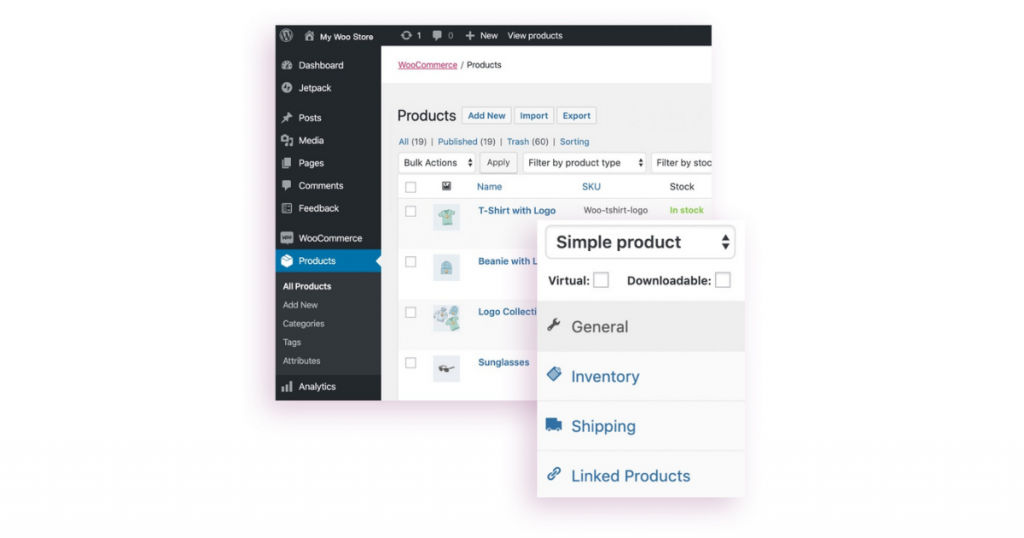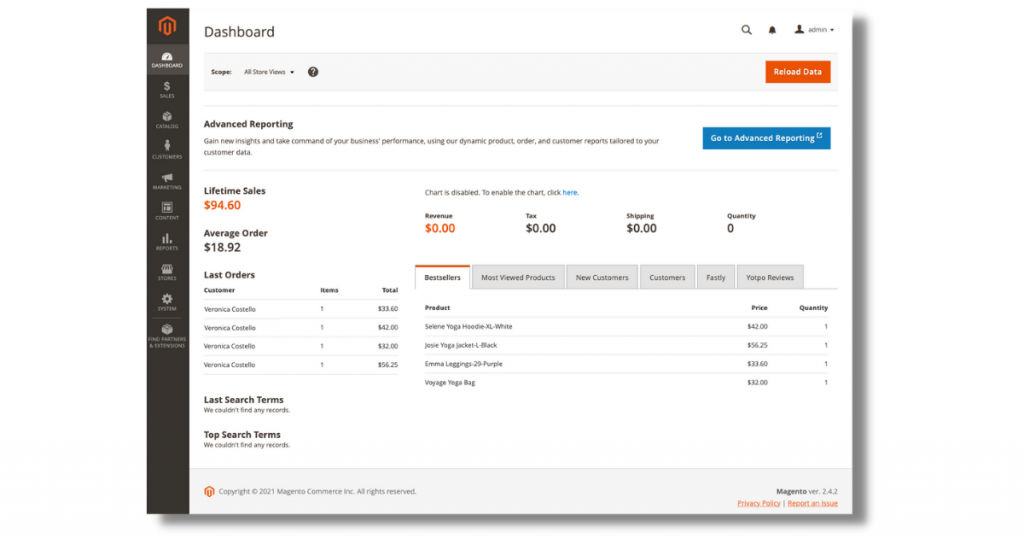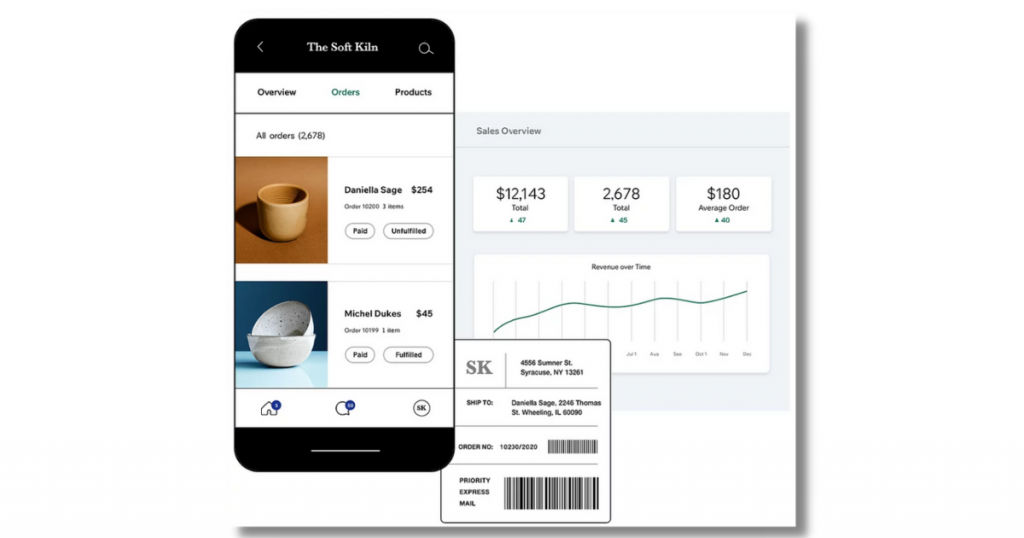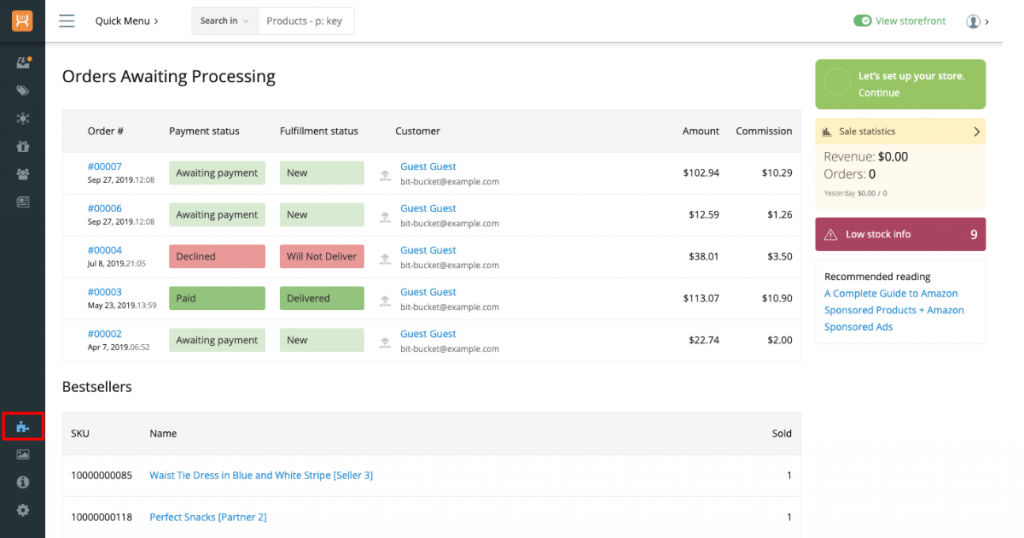
In this internet era, almost every store is going online to sell their products. This can be done using an e-commerce platform. However, not everyone would like to pay for an e-commerce platform, and some would like to have an open source option as well. This is where free and open source e-commerce platforms step in.
The open-source approach has received a great deal of acclaim. These online store systems are maintained and developed by a large number of individuals all over the world. In this article, SaaSworthy has put together a list of the top 7 free and open source e-commerce platforms for you to consider.
Table of Contents
What is a free and open source e-commerce platform?
A free and open source e-commerce platform is designed specifically with the aim of providing you with a shopping website. The best thing is that each of them is completely free and continually evolving. This sort of e-commerce framework is intended for fast-growing businesses that have a developer to handle the overall website.
Top 7 open source e-commerce software
An open source e-commerce software is a software that is made publicly available for anybody to view the source code. Anyone with development resources can modify and personalize the platform to meet the commercial needs of the market. A young company wanting to take advantage of e-commerce or just experiment can go for free and open source e-commerce platforms.
1. WooCommerce

Woocommerce is a free and open source e-commerce platform. It has been downloaded over 14,095,689 times and has a market share of 38%. Therefore, it is SaaSworthy’s top choice. This was built by the equally well-known WooThemes to assist shop owners in converting any WordPress site into an e-commerce website.
The various features of WooCommerce include –
- You can use plugins and extensions from the WooCommerce Marketplace to improve the online store’s look, advertising, point of sale, finances, and tax administration.
- It can accept nearly any type of payment method, and it can be tailored to affiliate programs and other business structures.
- It organizes commodities and content in a modular manner, including several categories such as top-rated, bestsellers, on-sale, etc., on the website.
- It protects the site by screening for malware automatically, requiring verified customer logins, and preventing brute force attacks.
- It can produce personalized emails in order to retrieve forgotten carts and automate promotions.
The limitations of WooCommerce are –
- It is not suitable for beginners due to the steep learning curve.
- It is difficult to integrate multiple currencies for shopping.
2. Ecwid

Ecwid is an open source e-commerce platform that allows you to sync and sell across your website, social media platforms, and marketplaces. This platform is used by entrepreneurs, small businesses, and medium-sized businesses. It is used in 175 countries by hundreds of thousands of retailers.
The various features of Ecwid include –
- Ecwid allows you to sell on several websites at the same time.
- The whole shopping cart is mobile-optimized by default.
- Aside from unlimited bandwidth, you also receive a mobile-friendly design, two product segments, and support for up to ten products.
- It offers a lot of flexibility for developers to code and transform any website into an e-commerce site.
- The platform provides a safe framework for managing payments from over 40 different payment methods.
- You can provide your consumers with shopping experiences and allow them to browse their product list by dragging and dropping goods into their cart.
- In order to increase revenues, it keeps track of inventories and orders.
The limitations of Ecwid are –
- There are not many options available for customization.
- The customer support is not fast in responding to queries.
3. Magento Open Source

Magento is a cloud-based free and open source e-commerce platform by Adobe that enables small, medium, and big businesses to develop customized websites. Magento accounts for around 27% of the e-commerce software industry. Online store owners can make use of a plethora of free features with the Community Edition. Magento has 250,000 merchants and 200,000 developers globally.
The various features of Magento Open Source include –
- It makes use of Adobe Sensei AI and real-time data to deliver highly customized search results to customers.
- It creates a unified cross-channel experience across different sites, shops, brands, and warehouses.
- It keeps track of inventory across several channels, manages refunds, cancellations, and back-orders, and offers consumers flexible alternatives.
- It syncs inventories, product catalogs, and selling prices to the Amazon marketplace, allowing you to sell and distribute items directly from the dashboard.
- It monitors the customer’s purchasing habits automatically using AI-powered algorithms and provides tailored suggestions.
- With a web application that is accessible on mobile and desktop, it increases interaction, improves conversion rates, and diversifies income sources.
The limitations of Magento Open Source are –
- Users can find it difficult to set up and install.
- Magento can reduce the speed of your website as it needs a lot of CPU and RAM power.
4. Square E-commerce

Square E-commerce is an open source e-commerce software that enables small businesses to establish a free e-commerce platform. You do not have to pay anything to create an e-commerce store. Not even for hosting purposes. In fact, you don’t even need to know anything about coding to get started.
The various features of Square E-commerce include –
- You can classify products into subcategories and generate category pages automatically, show products in list view, show similar products, and adjust zoom view.
- You can manage your inventory, monitor stock levels, and it sends you email alerts when stock levels drop.
- It enables debit cards, credit cards, and Apple Pay payments in different currencies through Stripe, PayPal, and Square.
- It adheres to country-specific shipping rules and uses 3D packaging algorithms to calculate the dimensions and cost of individual products.
- It provides a secured single-page checkout that is mobile-friendly and the ability for consumers to skip directly to the checkout page.
The limitations of Square E-commerce are –
- There are limited customization options and lacks some features.
- There are frequent account stability issues along with poor customer support.
5. Wix E-commerce

Wix E-commerce is unquestionably one of the most well-known cloud-based free and open source e-commerce platforms. Wix also provides an additional alternative for creating a visually appealing free website. The free plan is especially suitable for novices who want powerful tools for creating and hosting a basic e-commerce business website.
The various features of Wix E-commerce include –
- You can create a personalized website with drag-and-drop capabilities and select from over 500 layouts and 100 fonts.
- You can make your website mobile-friendly by using photos, videos, animations, text, and scroll effects such as parallax, zoom-in, fade-in, etc.
- Payment processors, abandoned cart recovery, worldwide delivery providers, and other additional e-commerce website features are also available.
- When you sell online through your e-commerce website, Wix allows numerous payment options and does not charge a commission for your sales.
- With customized coupons, redeemable points, and incentives, and presents upon direct purchase, it encourages recurring purchases and increases customer loyalty.
The limitations of Wix E-commerce are –
- There are a lot of advertisements that can be annoying and confusing to navigate through.
- It does not allow you to sell through different channels.
6. Big Cartel

Big Cartel is a free and open source e-commerce website builder that assists artists in selling their work both online and offline. It provides personal domains, configurable themes, package tracking, and real-time statistics. It is especially suited for individuals and small enterprises that are unlikely to increase in the near future.
The various features of Big Cartel include –
- Using design templates or editing source code with the HTML and CSS editors, you can personalize web pages and add corporate branding.
- You can use the available apps to help with social media marketing, customized printing, customer care, website analytics, logistics management, etc.
- It offers tailored product descriptions, gathers inbound links, and provides professional advice on enhancing search engine results.
- It has an onboarding procedure that will assist you through the process of setting up your e-commerce website if you run into any problems.
- The analytics dashboard allows you to monitor monthly earnings, customer data, conversion rates, and other metrics.
The limitations of Big Cartel are –
- The payment options that it offers are limited to a select few.
- It is not suitable for big e-commerce businesses requiring advanced features.
7. X-Cart

X-Cart is a free and open source e-commerce platform for retailers and small companies. X-Cart serves as the backbone for over 35,000 unique, high-performance online businesses in 111 countries worldwide. Since its inception in 2001, X-Cart has evolved into much more than an open source e-commerce platform to develop an enterprise e-commerce store.
The various features of X-Cart include –
- To offer customers a hyper-localized experience, it accepts different currencies and offers region-specific payment alternatives, and also supports multiple languages.
- Because it is free and open source, there is some professional development help available.
- Because it is written in PHP, you can easily create new integrations by yourself.
- The dashboard allows you to advertise brands, update catalogs, keep logistic and tax records, and reply to feedback.
- It allows you to synchronize cash flow and inventory between your regular shop and online e-commerce shop.
- With a SiteMap, simple and relevant URLs, customizable meta descriptions, and page names, it optimizes click-through rates and maximizes conversion rates.
The limitations of X-Cart are –
- A specialist is required for the programming and customization of the website owing to its complexity.
- It does not entirely support some third-party templates.
Conclusion
We hope that we were able to throw some light on the various free and open source e-commerce platforms available in the market. You should also note that all of the software mentioned above have paid versions as well. You can pay as per your needs to unlock the additional features. You should now be able to choose a free and open source e-commerce software best tailored to your needs.
If you are searching for a shopping cart software, take a look at SaaSworthy’s list of shopping cart software.
Also read:
• Top 5 E-Commerce Pricing Strategies to Drive Sales
• 6 Free Inventory Management Software to Scale up Your Supply Chain Management



![10 Best Free and Open-Source Landscape Design Software in 2024 [Updated] SaaSworthy Blog Header](https://images.saasworthy.com/blog_latest/wp-content/uploads/2021/04/Blog-Header-Image.png)


